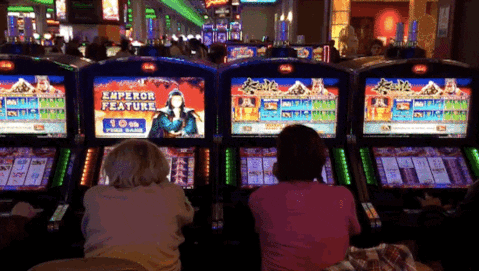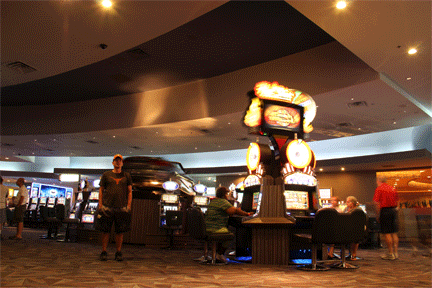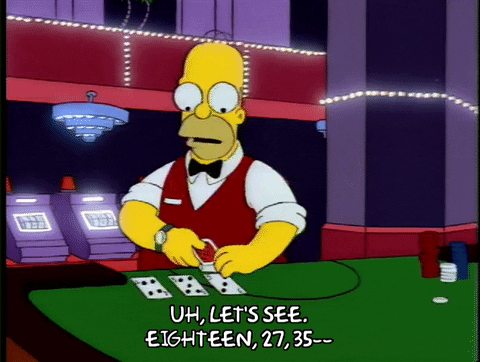Luck, Lies, and Algorithms SiMPL #017
How Casinos and Predictive Systems Shape Our Decisions Without Us Noticing
4 Carlsbergs, Please! 🍺
November 2024 was a month I spent more time in casinos than I ever thought I would—some for work, some for fun, and all of it leading to an interesting realization.
I was attending DevLearn 2024, a massive conference for learning technologies, and what better place to host such a spectacle than Las Vegas? From the moment you step off the plane, you’re hit with a sensory overload: flashing lights, upbeat music, and an unmistakable scent—a mix of smoke and decadence. It’s like Disney World for adults, designed to keep you entertained while making your wallet significantly lighter.
This wasn’t my first time in Vegas, but it was the first time I experienced it with such a packed schedule. With keynotes to attend, workshops to participate in, and colleagues to meet, there wasn’t much time for exploring the city. But I managed to squeeze in a little fun. I caught KA with my brother (from another mother that is also the mother life gave me—yeah, it’s complicated, but maybe in a different newsletter I’ll explain), grabbed some Southern food, and shared a few laughs with friends.
And then came the highlight: a mini-reunion with Freddy, a friend flying in from Singapore for a wedding. Freddy was no Vegas rookie—he’d been here before and knew his way around the poker tables. Victor and José, on the other hand, were the Vegas newbies, wide-eyed and ready to soak in the city’s charm (and chaos) for the first time.
Victor and José had packed their days with tours to the Hoover Dam, the Grand Canyon, and other attractions, soaking in the Vegas highlights like seasoned tourists. Meanwhile, Freddy had a more laid-back agenda. On the second day of the conference, I had a free lunch break, so I texted Freddy to meet up.
We decided on some Southern food at the MGM Grand—fried chicken and BBQ ribs. Since pork is frowned upon in Singapore for cultural reasons, Freddy was savoring every bite. Over lunch, we swapped stories: Freddy regaled me with tales of life in Singapore and some of his poker table antics, while I shared my whirlwind experiences from the conference workshops and keynotes.
Freddy, being Freddy, couldn’t resist the allure of the poker room. So, after we finished eating, I escorted him to the MGM poker tables before heading back to my conference grind. Not to put him on the spot, but if you remember Mr. Chow from The Hangover—well, let’s just say Freddy’s bachelor years might have given the writers some inspiration!
By the time dinner rolled around, Freddy was still there. I got a text:
“Hey, let’s meet at the MGM.”
My response: “Wait… you’re still here?”
Despite my tight schedule, I couldn’t resist joining Freddy, Victor and Jose for a quick run on the Strip. My flight was at 9:30 PM, so we met around 8 PM. The first bar we saw, I said, “My treat!” and ordered four pints of Carlsberg. We laughed, caught up, and shared stories that felt like a perfect capstone to an otherwise hectic trip.
Before I knew it, I was at the airport, retracing my steps and reflecting on the city. Vegas has a way of pulling you in, even if you’re not much of a gambler. I even slipped a $5 bill into a slot machine—knowing full well it wasn’t going to end in my favor.
And that’s when it hit me: Vegas, much like predictive algorithms, is a master of human behavior. It knows how to keep you engaged, how to dangle just enough hope, and how to make you believe in the thrill of the “what if.”
What We Know About Casinos
Before diving into the psychology behind casinos, let me share a moment that stuck with me during my trip.
During one of the conference breaks, I had a chat with Stephen, a guitar enthusiast who builds his own amplifiers—a level of dedication and craftsmanship I truly admire. Somehow, our conversation meandered from trick questions to measure real music knowledge to remarks on how impossible it is to play like Petrucci, and eventually into the world of casinos.
I mentioned how striking it was to see so many people glued to the slot machines, their eyes fixated on screens, as if hypnotized by the promise of a big win. It felt decadent, almost surreal.
Stephen, almost without hesitation, replied, “Just look around—watch the people playing, and then take a look at the casinos themselves. All that golden décor, the chandeliers, and this entire city’s opulence—it’s all built on what they spend sitting at those machines.”
And he was right. The decadence of the casinos wasn’t just in their design; it was in the subtle manipulation of human behavior. Every ding of a slot machine, every flash of lights, every faint scent wafting through the air was carefully calibrated to keep people playing, spending, and believing in the thrill of the next win.
What Casinos Know About Us
And that brings us to the science of gambling. It turns out, casinos don’t leave anything to chance when it comes to human behavior. They employ behavioral scientists, statisticians, psychologists, and mathematicians—true experts in experience design—to create environments that keep us coming back for more.
Thomas Zentall, a professor at the University of Kentucky, has extensively studied the psychology behind gambling. He explains that these behaviors tap into evolutionary survival mechanisms. For our hunter-gatherer ancestors, the unpredictability of finding food was a critical part of survival. You’d go from Point A to Point B with no luck, then finally hit the jackpot at Point C. That rush of success was life-saving—and it’s the same dopamine-driven reward system that casinos exploit today.
Here are three key strategies casinos use, backed by Zentall’s insights, to ensure your attention (and wallet) stay firmly in their grip:
1. Opportunity: It’s the hook that gets you in the door. The chance to win something of value—whether it’s a small jackpot, a free drink, or a life-changing sum—triggers our innate sense of possibility and excitement.
2. Unpredictable Rewards: You know a win is possible, but not how much or when. Zentall’s research shows that variable rewards create a heightened sense of anticipation. This is why slot machines—and even mobile games—are so addictive. The uncertainty is the thrill, and it keeps you spinning those reels.
3. Quick Repeatability: The faster you can play, the more likely you are to keep going. Casinos optimize for speed—you can play up to 16 slot machine games per minute. Zentall points out that rapid, repetitive cycles like this reinforce the reward system, making it harder to walk away.
The Psychology of Near Misses
Then there’s the genius (or evil brilliance) of near misses, a phenomenon Zentall’s studies highlight. Imagine you’re at a slot machine. The first reel stops on a cherry. The second reel, another cherry. The third reel… just barely misses. You didn’t win, but it felt like you almost did. That “almost” is enough to trigger the same reward centers in your brain as an actual win. The result? You’re more likely to keep playing—and spending.
This concept ties directly to our hunter-gatherer roots. Zentall’s research points out that humans evolved to persist in seeking rewards, even when success wasn’t guaranteed. Imagine foraging for fruit: Point A? No food. Point B? Still no food. Point C? Jackpot—a tree full of ripe fruit. The uncertainty of when or where you’d find food didn’t discourage you; it drove you to keep looking because persistence meant survival. Casinos exploit this very instinct, using symbols like cherries and other fruits to tap into our primal reward systems.
I experienced this firsthand during a recent visit to a casino in Panama with Freddy. We were at a blackjack table, and there was an extra side bet—a jackpot for hitting three 7s. The pot had grown to $8,000, and everyone at the table was joking about it. Then Freddy drew two 7s. The room buzzed with anticipation as we waited for the dealer to reveal the third card. Would it be the jackpot?
The suspense was palpable, but instead of the moment of truth, the card shuffler “conveniently” malfunctioned. A manager came over to fix it, stalling the game while the bartender distracted Freddy with some convoluted excuse about drink limits. When the game resumed, the third card wasn’t a 7. It wasn’t even close. Yet that moment of “almost” felt like we were on the edge of something huge, keeping us hooked for just one more hand.
It’s not just about near misses. Even half-losses play a role. Bet $1, and the machine flashes celebratory lights and plays a victorious tune when you “win” back $0.50. You’re technically losing, but it feels like progress. It’s a psychological nudge to keep going, to chase that big win just around the corner.
The system is so intricately designed that it’s no wonder the house always wins. Whether it’s the thrill of the “almost” or the illusion of victory, casinos know exactly how to keep you coming back for more.
Closing Time at the Blackjack Table
After wrapping up our blackjack run—cutting our wins and losses—we decided it was time for a break. At 2 AM, we found ourselves in an old restaurant, sharing sandwiches and reminiscing about the night. The laughter, the near misses, and Freddy’s almost-jackpot were all part of the experience that reminded me why these places are so alluring. Casinos don’t just play the odds; they play on our stories.
Casinos: The Perfect Prediction Machines
It’s easy to think of casinos as places of pure chance, where luck determines the outcome. But here’s the twist: casinos are not just places to gamble—they’re meticulously designed prediction machines. Every detail, from the placement of slot machines to the background music, is calculated to influence your behavior.
And it works—spectacularly. According to Statista, the gross gaming revenue of the U.S. gambling industry reached $66.65 billion in 2023, an increase of more than $6 billion from the previous year. That’s not just a lot of money; it’s a testament to how deeply these systems understand and exploit human behavior.
When you step into a casino, you’re entering an environment shaped by decades of behavioral science. The designers know how long you’ll stay, how much you’re likely to spend, and what will keep you coming back. Casinos aren’t gambling; they’re calculated investments—and you’re the one making the deposits.
The Dangers of Gambling Addiction
But all this clever design comes at a cost. Gambling addiction is one of the most destructive forms of dependency. The suicide rate among gambling addicts is 12 times higher than any other addiction. Retired individuals, particularly those with fixed incomes, are especially vulnerable—some studies show they spend up to 96% of their income on gambling.
Casinos might be designed to entertain, but they’re also built to exploit vulnerabilities. Understanding the psychology behind their design can be a powerful tool in resisting their pull.
From Blackjack to Algorithms
It’s not just human psychology keeping casinos running. AI and advanced algorithms have taken the game to the next level. From detecting patterns in gambling behaviors to designing layouts that maximize foot traffic, technology helps casinos become ever more efficient in separating us from our wallets. The same techniques that predict your next movie on Netflix are being used to ensure you spend just a little longer at the slots.
A Chip That Taps Into the Multiverse
But casinos aren’t the only place where algorithms and predictions shine. Imagine a chip so advanced it could computed based on our universe, and others at the same time. Sound like science fiction? That’s exactly the kind of thinking behind Google’s Willow chip—a quantum computer that raises as many questions as it answers. Could this same predictive power redefine other fields, from elections to everyday decisions?
Next Week: Prediction, Elections, and Quantum Possibilities
Next week, we’ll dive deeper into how prediction is shaping fields like elections and explore the tantalizing potential of quantum computing. To set the stage, I’ll leave you with a book recommendation that brings these concepts to life.
Book Recommendation: Randomize by Andy Weir
Andy Weir, the literary genius behind The Martian—yes, the book that became a blockbuster movie starring Matt Damon—is a master at combining science and storytelling. His ability to take complex concepts and wrap them in gripping narratives has earned him a dedicated fan base. After the success of The Martian and Project Hail Mary, Weir ventured into the world of short fiction with Randomize, a story that’s every bit as engaging as his longer works but packs its punch in a fraction of the time.
Let me set the scene: it was my wife’s birthday, and she had planned a photoshoot wearing the Panamanian folk dress—the pollera. Now, my wife wasn’t born here, but let me tell you, she’s Panamanian to the bone. In fact, the date that marked the beginning of our relationship was when I invited her to a traditional Panamanian wedding in the countryside—so go figure. This photoshoot was her moment, complete with hair, makeup, and solo pictures. I knew I’d be waiting, so I grabbed Randomize.
It was perfect timing. The story took me just about as long as her makeover—an hour, maybe an hour and a half. And wow, what a page-turner. Weir has a knack for storytelling that hooks you immediately, keeps you engaged, and leaves you wanting more.
So, what’s it about? Randomize dives into the world of quantum computing—set in a casino, no less. The casino uses a cutting-edge quantum computer to ensure their machines are unbeatable. No one wins. But here’s the twist: someone finds a way to flip the script, turning the seemingly invincible system against itself. It’s clever, thrilling, and gives you a glimpse into the mind-bending world of quantum mechanics—all wrapped in Weir’s signature storytelling.
Here’s a line that stuck with me:
“The problem with quantum computers isn’t that they don’t follow the rules. It’s that they follow all the rules at once.”
If you’re looking for a quick, gripping read that also sneakily teaches you about quantum computing, this one’s for you. And hey, it might even get you thinking about how much of life really is just chance—or carefully calculated probabilities.









